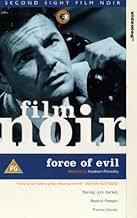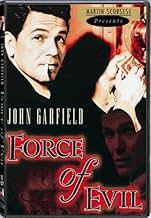An unethical lawyer who wants to help his older brother becomes a partner with a client in the numbers racket.An unethical lawyer who wants to help his older brother becomes a partner with a client in the numbers racket.An unethical lawyer who wants to help his older brother becomes a partner with a client in the numbers racket.
- Awards
- 1 win total
- Freddie Bauer
- (as Howland Chamberlin)
- Comptroller
- (uncredited)
- Sorter
- (uncredited)
- Sylvia Morse
- (uncredited)
- Sorter
- (uncredited)
- Detective
- (uncredited)
- Mother
- (uncredited)
- Attorney
- (uncredited)
Storyline
Did you know
- TriviaIn order to show cinematographer George Barnes how he wanted the film to look, Abraham Polonsky gave him a book of Edward Hopper's Third Avenue paintings.
- GoofsDuring a climactic montage set at an East Coast racetrack on the Fourth of July, people in the stock footage crowd scenes are dressed in winter garments nobody would wear in the middle of summer.
- Quotes
[after Joe bails his brother, Doris and the others out of jail]
Doris Lowry: You know I've got my whole life to think about now and you won't be of any help.
Joe Morse: How do you know? You know everything I touch turns to gold. It's raining out and I promised my brother to take you home.
Doris Lowry: Well, that's a lie.
Joe Morse: Well, it's not true; but I would have had he asked. You know you can't tell about your life 'til you're all through living it. Come on, I'll give you a lift. You're tired, I'm tireder. What can happen to either one of us? You tell me the story of your life and maybe I can suggest a happy ending.
- Alternate versionsAll existing copies of the film are of the version that was cut by 10 minutes in order to fit into a double bill.
- ConnectionsEdited into American Cinema: Film Noir (1995)
But a few differences help cast a light on what this is:
- the protagonist is not a gumshoe unraveling a case or hapless schmuck crushed by the fates. He's a cocky narrator, as much in control of what happens as anyone else, and in on it from the start. He has the usual fast-talking bravado, he glides smoothly, sweeps the girl off her feet. And yet his real impetus is wanting to pay back a big brother who sacrificed to get him out of tenement life.
- the girl is not some world-savvy dame but a sweet, innocent soul who instinctively backs out of the racket when it starts to feel wrong and is ready to fall for him only tentatively, guarding herself as she gives way.
All through this New York looks gritty rather than sultry, the narrative light is harsh and anxious. The contrast is between not entirely legal but not entirely immoral slum life, and the new cut-throat world of big business coming for the little guy. It's a bit of stretch to show the smalltime hustlers as the personable 'good guys' but that's the short-hand used. Its real progenitors are gangster films.
- And third, there is a scheme underway that resolves all this, to turn a numbers racket run piecemeal from tenement backrooms into a respectable, lucrative business run from Wall Street.
There's a lot of talk throughout, in that rat-tat-tat fashion of Hollywood. The dialogue verges on histrionic, and the whole has a verbose feel, but one that feels like someone has studied this life and is trying to come back with an honest depiction. It has a thickness of world to it, although the mannerisms are obvious.
Here's the cinch and what probably earned the movie a reputation as left-wing and landed the filmmaker in the famous HUAC blacklist.
The scheme works, the older brother eventually goes along with it, who had earlier made a big moral stand against it. The girl is swept off her feet. Our guy stands to make a fortune, help his brother, and get the girl who is not a dame like his boss's wife.
Except, in unchecked capitalism no one is really in control. Police had been watching but it's the nerve-wracked bookkeeper who sets the scene for grievous consequences to follow. The moral resolution is that it works but at what price to the soul; the lesson remains that a life of scheming doesn't pay and I'm not bowled over in this case.
Even more pertinently however, were the smalltime hustlers a boon to their community? They were running much the same lottery, working peoples' money for the promise that maybe this week it'll be you. But it seems there were bonds of community which the merger frays and disturbs. You'll see that it's our hero's tie to a human story rooted in community that really foils the plan.
The evocative finale with the couple descending stairs with the Brooklyn Bridge hulking above them is a favorite. In fact my favorite bits here all revolve around these two and their unlikely bond, their playful interplay against the larger background.
- chaos-rampant
- Aug 6, 2019
- Permalink
- How long is Force of Evil?Powered by Alexa
Details
- Release date
- Country of origin
- Official sites
- Language
- Also known as
- The Numbers Racket
- Filming locations
- Production companies
- See more company credits at IMDbPro
Box office
- Gross US & Canada
- $948,000
- Gross worldwide
- $1,165,000
- Runtime1 hour 19 minutes
- Color
- Aspect ratio
- 1.33 : 1
Contribute to this page




































